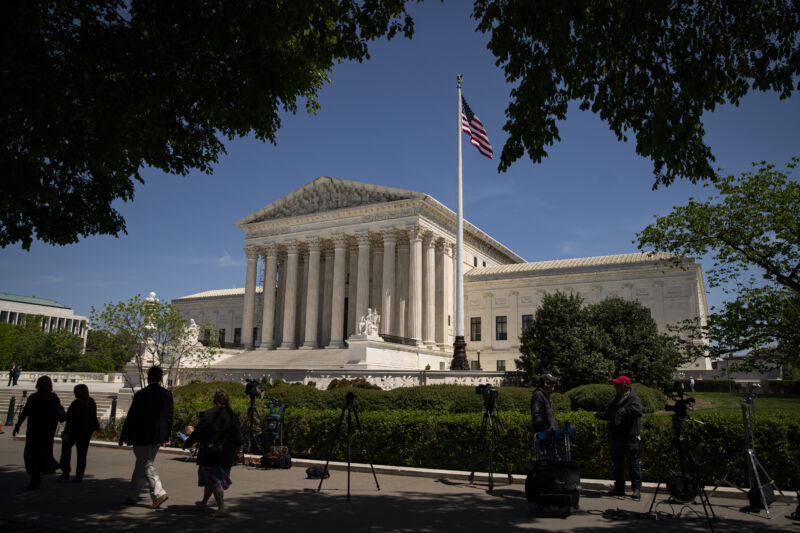
The Supreme Court on Friday issued an order that will maintain status quo access to the abortion and miscarriage drug mifepristone as the legal battle over the Food and Drug Administration’s approval and regulation of the drug continues. The court did not explain its reasoning, but noted that Justices Clarence Thomas and Samuel Alito dissented.
The ruling overrides an order from the Court of Appeals for the 5th Circuit in New Orleans, which would have curtailed access to the drug as the federal government pursues an appeal of a district court ruling. That ruling, issued by conservative District Judge Matthew Kacsmaryk on April 7, would have revoked access to the drug entirely, finding the FDA’s 2000 approval of mifepristone was unlawful, as was the agency’s subsequent actions.
A three-judge panel for the appeals court, however, determined that the plaintiff’s in the case—a group of anti-abortion organizations and individuals, led by the Alliance for Hippocratic Medicine—had exceeded the statute of limitations in which they could have legally challenged the FDA’s 2000 approval. But, the judges ruled in a 2-1 decision to allow the rest of Kacsmaryk’s ruling, revoking the FDA’s actions in 2016 and 2021, which eased restrictions and access to the drug.
If the restrictions had been reinstated, it would have meant mifepristone would only be available for seven weeks into a pregnancy, not 10; that women would be required to go to three in-person doctor visits, rather than just one, possibly via telemedicine; the drug would not be allowed to be dispensed through the mail; and that doctors would have again been required to report all non-fatal adverse events.
In an appeal to the high court, Danco Laboratories, the maker of mifepristone (brand name Mifeprex), said the appeals court ruling created “debilitating uncertainty” and a “regulatory mess.” It wrote in its appeal:
In order to distribute Mifeprex under something other than the 2023 REMS [the FDA’s latest regulations], Danco must: revise product labels, packaging, and promotional materials; recertify providers; and amend its supplier-and distributor-contracts and policies (among other things). All of these are currently based on the 2023 REMS. So is Danco’s current distribution model. Before Danco can make any changes, however, it must have a new REMS—which will require Danco to submit and FDA to approve a supplemental NDA (sNDA). That process typically takes months. It is unclear whether Danco can continue distributing Mifeprex while that sNDA is pending before FDA even though it would technically be misbranded, or whether doing so would expose Danco to civil and criminal penalties. And then Danco might be required to jump through all of these hoops again if the injunction is ultimately modified or rescinded on appeal.
Further complicating the matter is a ruling from a district judge in Washington that barred the FDA from altering access to mifepristone in 17 states and the District of Columbia. And on Wednesday, GenBioPro, the maker of the generic mifepristone that was approved by the FDA in 2019, sued the FDA to block the agency from complying with any order to remove the generic from the market.
Overall, the case is the first time an inexpert district judge has ruled to vacate an FDA approval based partly on the argument that the FDA erred in its expert scientific analysis. If the anti-abortion groups ultimately prevail in the appeal, it will set a dangerous precedent, opening the floodgates for litigation to second-guess the FDA’s authority in regulatory actions and approvals and throwing drug development into chaos, according to legal experts, former federal officials, and numerous members of the pharmaceutical and biotech industry.
The court of appeals has placed the case on an expedited schedule and plans to hear the first oral arguments on May 17.
https://arstechnica.com/?p=1933736

